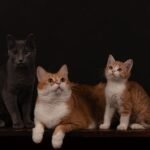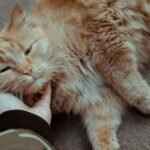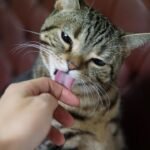Has your feline companion ever vanished the moment guests arrive at your door? Perhaps you’ve noticed your cat consistently choosing the quietest corner of the house, watching from the shadows while life unfolds around them. Just like humans, cats have distinct personality types, and some are natural introverts who prefer solitude to social interaction.
Understanding whether your cat leans toward introversion is crucial for their happiness and well-being. Introverted cats value peace and quiet much more than noise and constant hustle, drawing their energy from internal stimuli rather than seeking the spotlight. Let’s explore the telltale signs that reveal your cat’s introverted nature and learn how to create an environment where they can truly thrive.
They Master the Art of Strategic Hiding

One of the most common signs of an introverted cat is their tendency to hide or seek enclosed spaces. They may choose to burrow under the bed, in a closet, or even in a cardboard box. Unlike their extroverted counterparts who boldly greet visitors, introvert cats have perfected the disappearing act.
When a stranger comes over, forget about welcoming them. Instead, they’ll vanish in an instant, hoping to disappear altogether. You might have to search high and low to find them. They may stay hidden in a corner for a whole day, only emerging after the guest leaves, then cautiously venturing out.
This behavior isn’t stubbornness or rudeness. Some cats are introverts with fur. If your cat has always been the quiet, behind-the-couch type, that’s probably just who they are. Their hiding spots serve as personal sanctuaries where they can observe and assess situations from a safe distance.
Routine Is Their Religion

Both introverts and cats love ritual and routine, and if something changes unexpectedly, we might hide and hiss (inwardly) until we adjust. Your introverted cat likely follows the same daily patterns religiously, finding comfort in predictability.
Notice how they appear for meals at precisely the same time each day, claim their favorite sunny spot during afternoon naps, or perform their grooming rituals in exact sequences. If your cat scores low in impulsivity or spontaneity, it could mean that the cat is well adjusted to their environment, and enjoys their current routine.
Disruptions to their established schedule can cause genuine distress. Moving their food bowl to a different location or changing feeding times might result in anxious behaviors. Some cats may show stress if you suddenly move their food dishes, water, or litter to a new place – even inside the same house.
They Avoid Eye Contact Like a Pro

Introverted cats also tend to avoid eye contact with humans. They may spend long periods staring into space or at walls, which can be perceived as indifference or aloofness. In reality, they may be trying to avoid interaction or attention.
This isn’t antisocial behavior; it’s their way of communicating boundaries. Signs that indicate your whiskered friend is anxious include keeping their tail close to their body, avoiding eye contact, having dilated pupils, flicking their tail, staring, or holding their ears back.
Your introverted cat might look past you rather than at you, or turn their head away when you try to make eye contact. They’re essentially saying, “I acknowledge your presence, but I’m not ready for interaction right now.” Respecting this subtle communication helps build trust over time.
Solo Play Beats Social Games Every Time

Another sign of an introverted cat is their lack of interest in playing with toys or other cats. They may prefer to spend their time alone, sleeping or grooming themselves. When it comes to entertainment, these cats are perfectly content with their own company.
Some shy or fearful cats prefer solo play. With solo play, there isn’t any social pressure, and your cat is not required to share space with you or another playmate. Furthermore, solo play allows your cat to go at their own pace and have full control over the speed and type of play.
You might find them batting at dust particles in sunbeams, stalking imaginary prey, or engaging with simple toys when they think no one is watching. Provide them with ways to play on their own, such as a toy with a ball on a track or a scratching post with toys on an elastic cord. This independence in play is a clear indicator of their introverted nature.
High-Traffic Areas Are Their Kryptonite

Introverted cats prefer solitary spots, are less interactive, and may hide when the house is full. You’ll rarely find them lounging in the living room during family movie night or positioning themselves in the kitchen during dinner prep.
Instead, they gravitate toward quiet bedrooms, unused bathrooms, or that peaceful corner behind the bookshelf. They tend to shy away from any kind of commotion and are not comfortable being the center of attention. These cats have an uncanny ability to sense when the household energy is about to ramp up and make their strategic exit beforehand.
These cats may take their time warming up to new people and situations, preferring familiar environments. They tend to be easily startled and often seek quiet and calm spaces. Creating multiple retreat zones throughout your home gives them options when social situations become overwhelming.
They’re Sensitive to Environmental Changes

Introvert cats, compared to extrovert cats, are more sensitive. They aren’t as carefree as extroverts. They’re keenly aware of any changes in their environment and quickly react. Sounds, smells, light, etc., might trigger an immediate response from an introvert cat.
Your introverted cat notices everything. New furniture, different cleaning products, or even seasonal changes in daylight can trigger stress responses. The biggest source of stress for cats is often something new in their environment or routine. A move to a new house, a new baby or pet, weird new noises (like from neighborhood construction), or even unfamiliar guests in the house may trigger your cat.
They might react to seemingly minor changes that extroverted cats would ignore completely. This heightened sensitivity isn’t a flaw; it’s part of their cautious, observant nature that helps them navigate their world safely.
They Choose One Special Human

Introverted cats can be, contrary to popular belief, quite affectionate towards their Carers, wanting their attention and love time spent on the hooman’s lap. However, they usually find “the one” person to spend their time with.
While extroverted cats might shower everyone with attention, your introverted cat likely has a clear favorite. They may show minimal interest in other family members but become surprisingly affectionate with their chosen person. This selective bonding is actually quite special – you’ve earned their complete trust.
Both introverts and cats can take a long time to form a bond with others, making us appear aloof to strangers. But once someone makes us feel seen – someone who passes the “you’re actually kind of OK” test – this rare person automatically levels up to VIP in our world. This makes us want to cuddle up on their figurative (or literal) lap.
Observing From Above Is Their Preferred Perspective

When she first came to the Sanctuary, Amberly liked to hang out in the rafters at Cat World, watching the proceedings from above, but not participating. Since then, she’s warmed up, climbed down and ventured closer to the action. Many introverted cats prefer elevated vantage points where they can watch without participating.
You might find your cat perched on top of bookshelves, refrigerators, or cat trees, silently observing household activities. They love jumping and climbing up to the highest place where they can study the people in their home before deciding whether or not to interact. This behavior allows them to stay informed about their environment while maintaining a comfortable distance.
From these high perches, they can assess whether situations are safe for closer investigation. It’s like having their own private viewing box at the theater of daily life – they can see everything but remain detached from the action until they choose to engage.
Conclusion

Recognizing and respecting your cat’s introverted personality isn’t about changing them – it’s about creating a world where they can be authentically themselves. You can’t change an introverted cat to an extroverted one, or vice versa. But you can give them the opportunity to be themselves.
By understanding these eight signs, you’re better equipped to provide the quiet sanctuaries, predictable routines, and gentle interactions your introverted cat craves. Remember, their selective affection and cautious nature make their trust all the more precious when you earn it.
What signs have you noticed in your own feline friend? Share your observations and let us know how you’ve adapted your home to suit your cat’s unique personality!






